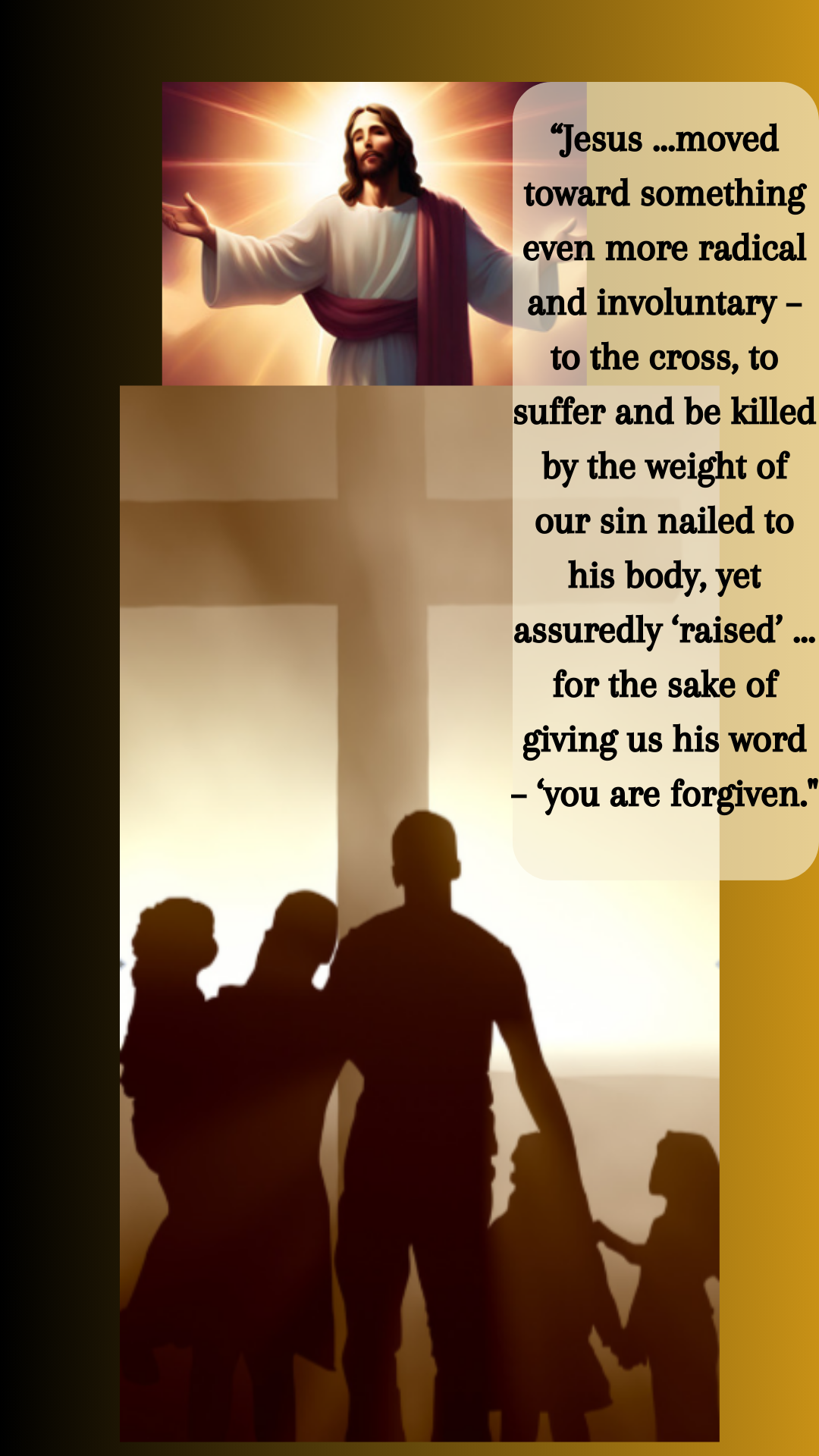THE LOVE THAT SURPASSES ALL AUTHORITY
Mark 1:21-28
Fourth Sunday after Epiphany
Analysis by Matthew DeLoera
21They went to Capernaum; and when the sabbath came, he entered the synagogue and taught. 22They were astounded at his teaching, for he taught them as one having authority, and not as the scribes. 23Just then there was in their synagogue a man with an unclean spirit, 24 and he cried out, “What have you to do with us, Jesus of Nazareth? Have you come to destroy us? I know who you are, the Holy One of God.” 25But Jesus rebuked him, saying, “Be silent, and come out of him!” 26And the unclean spirit, convulsing him and crying with a loud voice, came out of him. 27They were all amazed, and they kept on asking one another, “What is this? A new teaching—with authority! He commands even the unclean spirits, and they obey him.” 28At once his fame began to spread throughout the surrounding region of Galilee.
“Jesus …moved toward something even more radical and involuntary – to the cross, to suffer and be killed by the weight of our sin nailed to his body, yet assuredly ‘raised’ … for the sake of giving us his word – ‘you are forgiven.”
DIAGNOSIS: By Whose Authority?
Step 1 – Initial Diagnosis (External Problem): Authorized
Just when they thought they knew what to expect at synagogue, the assembly was “astounded” not just to hear this stranger (Jesus) teaching (can just anyone walk in off the street and teach?), but also “as one having authority.” His manner was nothing like the scribes’, as of trained authorities explaining doctrines, handing on old traditions, and insisting that it all really is “relevant” after all. His was an entirely new kind of proclamation, radiant with “might”, “power,” and “capability” (exousia). Perhaps folks even heard such a bold declaration as “this scripture has been fulfilled in your hearing.” (v. 21) And if all this wasn’t already more than enough surprise for one sabbath, as if to further legitimize Jesus’ authority, in walked someone with “an unclean spirit” that Jesus rebukes as proof-point. Nevertheless, the assembly still questions what to make of all that they have seen and heard – “What is this?”
Step 2 – Advanced Diagnosis (Internal Problem): Skeptical
It’s hard to imagine that the crowd isn’t also wondering, “Is he right?” That the assembly is questioning should not surprise us. In fact, such questions remain utterly necessary in such a world as this. In the face of disease or disaster, humans, even at the highest levels of power, have always despaired for some authority to explain and advise life-saving wisdom (i.e., the manner of the scribes) to hang onto said power. But there have always been and always will be many different “authorities” and conflicting answers. Which one should we trust, or risk peril? And even once we sign on, are we ever really sure that we’ve chosen rightly? After all, authorities can change their minds, science is a moving target, and people say a lot of things about God. So, as we hear ever bolder proclamations and promises, despite facts and reason, we feel increasingly skeptical and unsure. If we’re not responsible enough to “do our own research” (and who has time for that anyway?) we can only blame ourselves for our own misfortune. Or are we even more afraid of hearing “I told you so”? We can muster grit and determination, and we admire come-back stories. There’s a certain honor in these. But losing face is a real killer.
However, we also know a way to soothe ourselves amid all this questioning and uncertainty, not just regarding the chaos of our lives, but especially regarding God’s part in all of it. We take refuge in having our own authority – our right to choose (i.e., our “free will”) what to believe or where to put our trust.
Step 3 – Final Diagnosis (Eternal Problem): Powerless
Right or wrong, no one, not even God, can take that personal authority and free will away from us, right? Here, doubt and skepticism are recast from weaknesses to strengths, with just enough power to convince ourselves that we’re not as utterly powerless as we really are. Sure, we may testify that “by my own understanding or strength I cannot believe in Jesus Christ my Lord or come to him.” (Small Catechism, Creed, Third Article) Yet whose heart doesn’t still bristle at such suggestion to the contrary? Perhaps it’s because we’re not convinced that this God who seems to take as much as give, who seems to watch more than act, who lets innocent folks be demon-possessed at all, is particularly trustworthy. But God always gets the last authoritative word.
PROGNOSIS: By Love’s Own Authority
Step 4: Initial Prognosis (Eternal Solution): Forgiven
In this light, there’s a striking irony in this miracle of Jesus casting out a demon. Though we (and let us hope some of the synagogue assembly in our lection) easily praise Jesus for gracious healing, we don’t seem much fazed by the fact that the patient never asked for cure. We do not know if he was lucid to realize anything was being done to him, nor that he even came to synagogue of his own volition. We make a lot of assumptions, don’t we? Nevertheless, we jump right to the result – that this one is now free by and in Jesus Christ. It’s funny how easily the end justifies the means that formerly so offended us. Yet, Jesus was not done, but swiftly (euthus, Mark’s byword) moved toward something even more radical and involuntary – to the cross, to suffer and be killed by the weight of our sin nailed to his body, yet assuredly “raised” (Mark 16:6) for the sake of giving us his word – “you are forgiven.” This was nothing for which we ever asked, let alone anything we could ever have conceived, and done before we were ever conscious of it. And, what if this is precisely WHY it’s the only thing that actually softens our brittle and hardened hearts, precisely what no flavor of human authority will ever have any power to do.
Step 5: Advanced Prognosis (Internal Solution): Freed
So, perhaps the word “authority” falls short of what’s really happening in this lesson, and even why the assembly struggles to make sense of what Jesus has done. Jesus’ “authority” is so radically different from all the other & “authorities” in our lives, which wield laws (with attending laws and consequences) or reason to conform or convince us. Rather, Jesus’ “authority” is bound up in the affecting power of his love for us, which frees us to trust him, to take him at his Word – our final authority in his love.
Step 6: Final Prognosis (External Solution): Enfleshed
And because we trust, we get to love others without fear of consequence or betrayal. After all, we know what it did to Jesus, so why should we be surprised by anything else? We know full well what Jesus did to us, we no longer feel the need to justify ourselves or to prove anything to anyone, let alone pose as any sort of “authority”. Rather, we feel free to trust that Jesus’ love will assuredly speak for itself through the earthen vessels of our bodies, and all of this is pure gift for the sake of our neighbors. “It shall not return to me empty, but it shall accomplish that which I purpose, and succeed in the thing for which I sent it.” (Isa 55:11) Of course, Jesus never promised that this kind of new creation would ever be easy, especially when folks have known us through all our missteps and imperfections. After all, for all that Jesus said and did, the assembly still went away asking “What is this?” And yet, “for while we live, we are always being given up to death for Jesus’ sake, so that the life of Jesus may be made visible in our mortal flesh.” (2 Cor 4:11)





You must be logged in to post a comment.